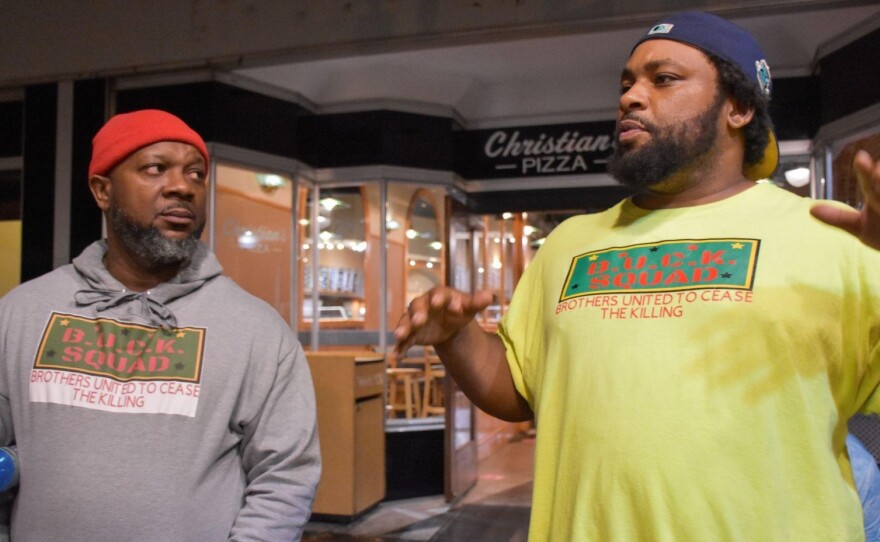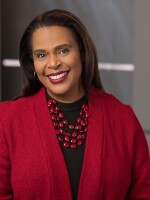Charlottesville has drawn national attention because of the horrific murders of three student athletes in November. But prior to the tragedy, gun-related murders had decreased in the city over the past two years, bucking both statewide trends. That may be due to the crime-prevention efforts of those committed to interrupting violence. Two such non-profits have received city funding to resolve conflicts before they become violent. One is Peace in the Streets. The other is the B.U.C.K. Squad.
VIDEO TRANSCRIPT
HERB DICKERSON: The B.U.C.K. Squad is a non-profit organization that got together back in 2019 because of a series of murders in Charlottesville. And we decided we'd get together and canvas these neighborhoods and put a stop to the gunfire.
BRYAN PAGE: It wasn't initially designed to be a program. It just, everybody met up. People was kind of fed up. So, I guess 60-70 people met at a church. And after three or four weeks of meeting in this church, it got broken down into a group.
HERB DICKERSON: A friend of ours named Buck, his name is Jamarcus Washington, but his nickname was Buck and he was a good neighborhood guy, and he was murdered with, you know, almost like an innocent bystander and we’d had enough.
BRYAN PAGE: So, we decided to use his name and just create an acronym, you know, to try to bring the city together. Brothers United to Cease the Killing. After that, the city paid for us to get some training to attack the problem and that's how it all started.
HERB DICKERSON: We develop relationships in all these communities, so people welcome us to come in, and that's usually how we get our information to find out who has quarrels with each other. And we go to each individual. I send the team to each individual to talk about it and see how we can solve it rather than gunfire. We have a mechanism in place where they just stay together, you know, go out and take an elderly person to the grocery store or cut the grass or something. We are connected to all the community, so people give us information, where we can get to them, the individuals who commit these crimes and talk to them, where police don't even have to get involved. So, I guess we would be pre-crime and police are post-crime.
BRYAN PAGE: We have two different objectives. Our objective is to stop violence. Their objective is to get there once it's already done, and take you to jail, to get you off the street. We not into that business. We're just trying to stop murders, gun violence in the city of Charlottesville, all over the city of Charlottesville. And I think we do a good job, based on our relationships. Because I've spent a lot of time in prison, so I'm able to express the hardships and the pains of prison on the real side.
HERB DICKERSON: All of us on my team have been to the penitentiary for long stints of time. So, I know that’s not really what you want, but if you haven't been given any other avenues to solve the issue, then you only know one way. And we try to teach and train folks that there is another way. Here, this is the most important aspect of what we do, trying to get to these kids right here so they don't join gangs and keep up the schoolwork, and obey their parents and, you know.
BRYAN PAGE: We’re providing jobs. We’re running the re-entry program. We’re getting ready to start doing some youth things for the kids, because this is what violence revolves around. You know, violence starts at the level of kids. They get out to the streets and don’t have nothing to do, they don’t have no football, no basketball, no baseball, no activities. We want to bring them all that. Educational programs like STEM programs, we want to bring all of that to the community. And then we want to deal with some of these housing deficiencies that's going on in the city because these are the things that revolve around gun violence. It starts the fight, poverty. You know, so we must address that first. Violence interrupting is ok, for now, but long term is of coarse programming within the community for the kids and adults.
HERB DICKERSON: If I can get maybe 40-50 more guys, that’s my dream. Where we can just be set up in each neighborhood all day long. Just get to know individuals and find out what their needs are. And how we can help them transition from the lifestyle they think they’re living now to a better and productive lifestyle.
BRYAN PAGE: Oh, the plan is to reconstruct these communities. Every member on our team wholeheartedly believes that we can change the whole trajectory of these impoverished communities in Charlottesville, with more work than just violence interrupting. We want to saturate the community with programs and resources. And when people have access to resources, things can change.








